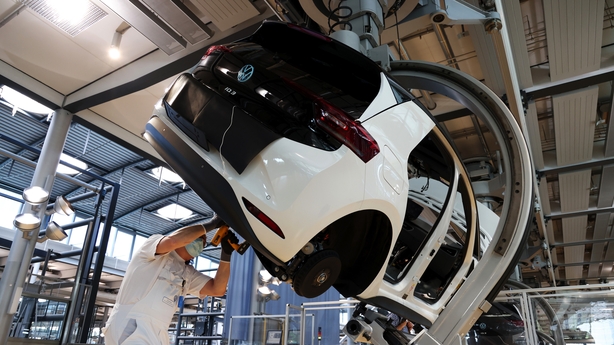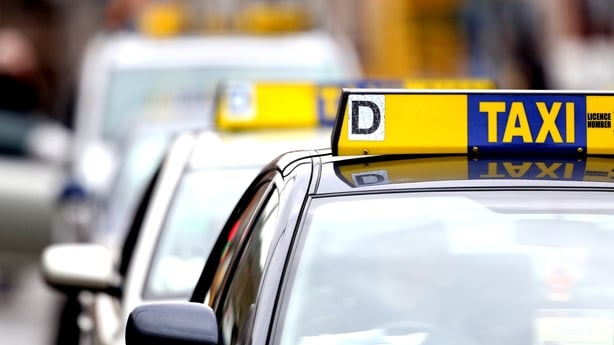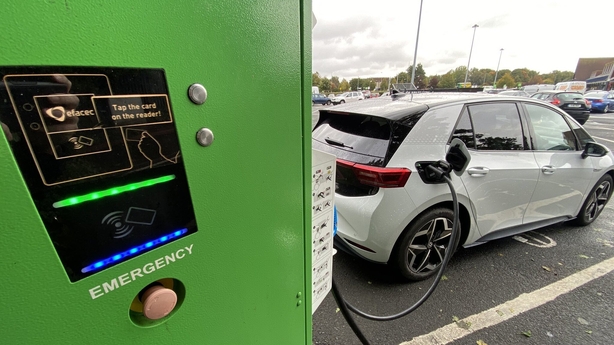Data from the Society of the Irish Motor Industry shows that 24% of all new cars sold in Ireland during the first three months of this year, can plug into the electric car charging network.
They are either fully electric or plug-in hybrid electric vehicles.
It means that new electric car sales have by-passed diesel car sales for the first time.
Head of Business Supports and Transport at the Sustainable Energy Authority of Ireland (SEAI) Fergus Sharkey said that with over 80,000 fully electric and hybrid electric vehicles now on Irish roads the market for electric cars is maturing and that a "tipping point" has been reached.
There are now 29 different manufacturers or makers of electric cars on sale in Ireland and there are more on the way.
Last year, electric cars sales nearly doubled to about 16,000.
This year, with sales so far up another 50%, it is expected that more than 20,000 new electric vehicles will be sold.
There is a huge selection from Audi, BMW, Fiat, Ford, Honda and so many more.

They range in price from the upper-mid €20,000s to around €100,000 for the very top models.
There appears to be no shortage of demand with dealers suggesting they could sell a lot more electric vehicles if they could only get their hands on them.
Brian Curran is Sales Manager at Joe Mallon Motors in Naas which recently won the SEAI Electric Car Dealer of the year award.
He says the biggest factor in favour of electric cars is the savings.
Even with the rise in electricity costs electric cars are far cheaper to run than petrol and diesel vehicles.
"People are curious, and it’s our job to educate them and to tell them that the time is now to switch," he said.
"What a lot of people don’t realize is that the servicing costs on electric cars are dramatically reduced because there are no oils, belts or filters and things like that to change.
"It’s just a check-over once a year. Motorway toll costs are dramatically reduced too. Yes, they are expensive vehicles. They are more expensive than a petrol or diesel car. But that is offset by the considerable saving to be made by running one," he stated.
Professor Hannah Daly, an expert in sustainable energy at the MaREI Centre at University College Cork, believes that the lifetime running costs of a car should be made clear at the point of sale and that this could make a big difference.

"People tend to just look at the sticker price when buying a car, whereas over the lifetime of a car, you are spending far more on petrol and diesel with combustion engines. All sorts of other charges are greater as well," she said.
Professor Daly said that electric vehicles are a very important solution for greenhouse gas emissions, but that sales are not growing fast enough.
"We’re still selling more and more fossil-fuel powered cars - petrol and diesel vehicles - every year. If that continues the only way to meet our legally binding carbon budget targets this decade will be draconian travel restrictions, or scrapping those cars prematurely at great public cost," Ms Daly said.
"Electric cars are not affordable for the vast majority of people, because most people buy second-hand cars. But there won’t be a good second-hand car market for electric cars unless we are increasing new car sales right now," she added.
SEAI’s Fergus Sharkey is also keeping a close eye on the second-hand market. He says he has seen an increase in second-hand electric vehicles.
Mr Sharkey said: "I checked in recent months and there were over 1,500 electric vehicles ranging anywhere from €5,000 right up to tens of thousands of euros for the higher models. I would suggest to people you can get a really good electric car with maybe 250-to-300-kilometre range for less than €20,000 second-hand at the moment.
"So, people should have a look at the second-hand market right now," he stated.
He concedes however, that Brexit has had a severe impact on the import of second-hand electric cars into Ireland and that changes are required to remove that blockage it has created.
"This is definitely an area that is going to have to be looked at, because cars imported from the UK are now subject to VRT, import duty and VAT because the UK is outside of the European economic zone. Yet the UK has always been a really important source of used right-hand-side-drive vehicles for Ireland. This is something that is going to have to be unlocked to give us that large second-hand market in electric cars that people are going to need," Mr Sharkey said.
Grant
Electric cars are about to become a little bit more expensive after the Government decided that the €5,000 purchase grant on the cars would be reduced to €3,500 from 1 July this year.
This will add €1,500 to the cost of all new electric cars currently selling for less than €60,000.
Cars costing more than that amount are not affected as they were not eligible for the €5,000 grant in the first place.
This decision could trigger an increase in new car orders being placed before the end of June. Once an order for a new car is placed the garage will have to deliver the car to the purchaser within four months to qualify for the full €5,000 purchase grant to be paid.
Since 2011, the Government has spent about €200 million in grants supporting the purchase of about 41,000 electric vehicles.
Currently, just over 60% of new battery electric vehicles in Ireland are grant aided.
Until recent years, the purchase of plug-in hybrid electric vehicles was also supported by grants, but they are not eligible anymore.
Taxi
It is a different story when it comes to taxis however.
The Government is making a concerted effort to encourage taxi drivers to switch to electric cars.

There are some very attractive inducements to get them to make the switch including a €10,000 car purchase grant and up to €10,000 for the scrappage of an older car.
So that’s about €20,000 to encourage taxi drivers to buy electric.
Not surprisingly, we are beginning to see a lot more electric taxis on our road.
The reason they are being treated so generously is that taxis tend to do high mileage. The higher the mileage the more greenhouse gas emissions that are saved by switching to an electric vehicle (EV).
There is also the demonstration effect that will encourage others to switch to electric vehicles if taxi drivers are doing it too.
"When you see a taxi driver in an electric car, you know a few things," said Fergus Sharkey.
"You know it’s reliable, you know it’s comfortable, and you know it’s cheap to run," he added.
Back at Joe Mallon Motors in Naas, Brian Curran highlights the non-cost aspects of driving electric.
"They are beautiful cars to drive. They are quiet. They are smooth. They are quick. They are safe. The technology in them is fantastic and makes the cars extremely easy to drive," he said.
He concedes that there is a big concern among potential purchasers about "range anxiety". That is the fear that the car will run out of power and the driver could become stranded on their journey.
"You find that people are afraid that they might be caught in the middle of nowhere. But how often are you in the middle of nowhere? You do most of your charging at home. A lot of workplaces have charging facilities now as well. The public infrastructure is ready for the times that you might go away for a weekend, or take a trip down the country, or something like that," Mr Curran said.
Infrastructure
Aoife O’Grady, is Head of Zero Emission Vehicles Ireland (ZEVI), a division in the Department of Transport charged with overseeing the electrification of our national car fleet.
"We are working with the industry to ensure that the charging infrastructure will be where people need it to be, it will be easy to use and it will be as affordable as possible," she said.
"We want home charging to be the default position for as many people as possible. That’s because it’s convenient, it’s easy to use, it’s where you live and it’s affordable. It is the cheapest form of charging," she added.

It costs somewhere between €1,200 and €1,500 to install a typical home electric car charge point and the SEAI will provide a grant of €600 towards that.
ZEVI are also putting plans in place for people who will never be able to access their own home charging facility.
An apartment charging scheme run by the SEAI was launched last year to provide charging for people who live in apartment blocks or in multi-residential units.
This year ZEVI is starting to work with local authorities to provide slower overnight charging facilities in more built-up areas where there is no off-street parking.
There are just over 1,700 public charge points nationwide. That number is increasing week on week.
"We are also starting to see private infrastructure charging operators rolling out new charge points every month. We are trying to work with those to ensure that the network is as broad as possible, that there are no gaps, and that people have the chargers with the right power where they need it," Aoife O’Grady said.
She also wants to highlight ZEVI’s new grant scheme for the installation of electric car charging points at sports facilities.
"We are looking at providing charging stations in at least 200 sports clubs, with about six charge points in each sports club. So that would be about 1,200 charge points under that scheme alone," she stated.
"We are also looking at doing a similar scheme with community centre charge points. And then the other destination charge points too," she added.
"That is where the government funding is going," she concluded.
To qualify for this scheme a sports club car park needs to be open to the public for at least five days a week and for at least 10 hours a day. If it is a members only car park, then it is not eligible for funding. It must be accessible to the public at large.
ZEVI has funding to install public charging stations at 200 sports club, but it has already received applications for the grant from 600 clubs. It is massively oversubscribed.








